Do you ever hear a sloshing sound from your propane tank and wonder if it's a dangerous sign? Don't worry! We researched if it is safe to use, and here is what we found.
Yes, it is safe to use. When you hear or feel that there is liquid inside your propane tank, it's normal because propane is stored as a liquid.
Keep reading as we discuss if it's normal for your propane tank to feel like there's liquid inside it, if it's safe to use, and how to tell if there's water inside your tank. We'll also tackle why you should use propane for your home, the dangers of using this type of fuel, and how to properly store it. Additionally, we'll share tips on how to check for leaks and what to do when you find one.
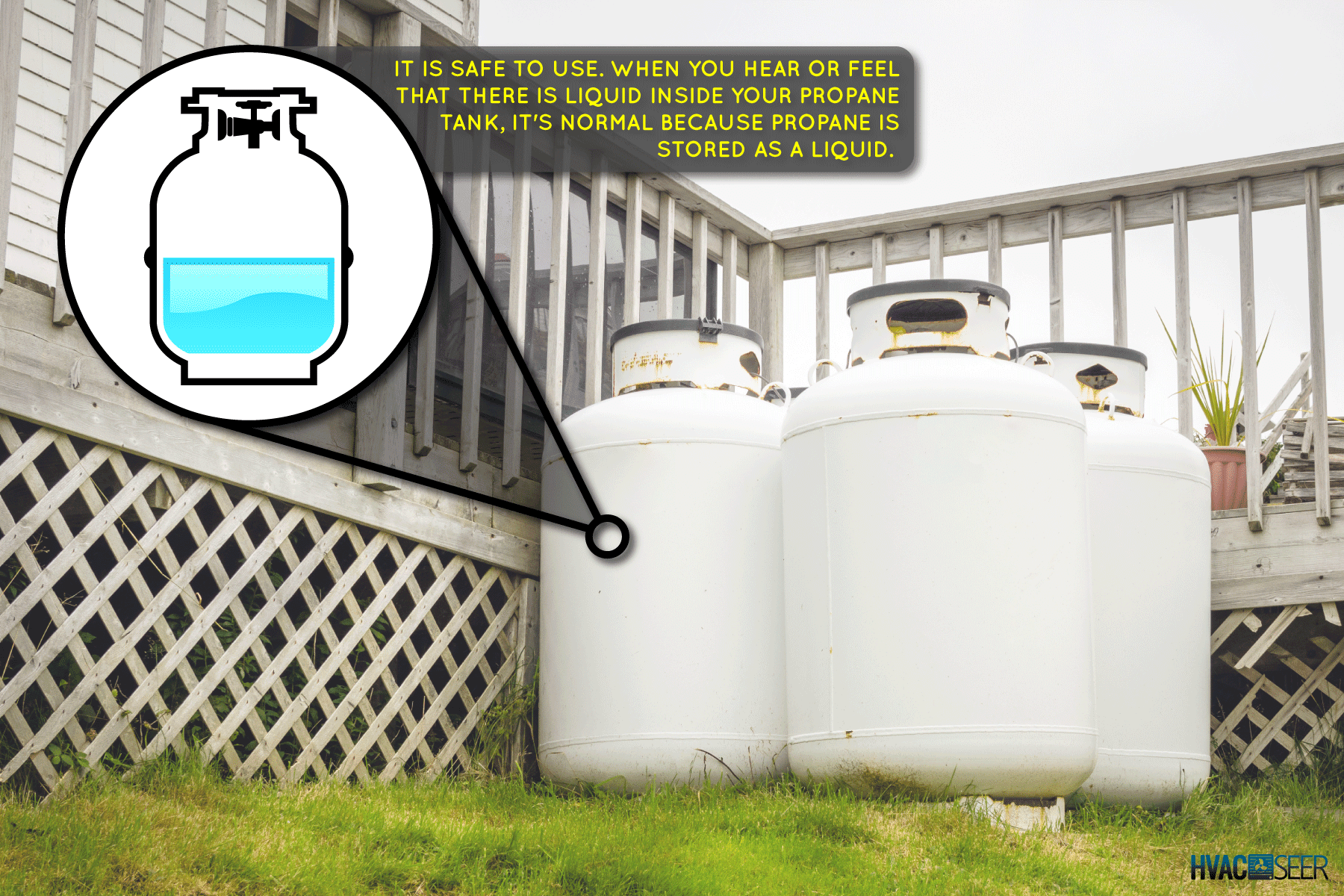
Is It Normal For Propane Tank To Feel Like There Is Liquid Inside?
Yes, it is normal. Because it takes up less room and can be transported more readily in this manner, propane is stored as a liquid. Approximately, liquid propane takes 270 times more space than gas. This way, liquid propane takes longer to empty compared to gaseous propane.
Is it Safe To Use A Propane Tank That Feels Like There Is Liquid Inside?
Yes, it is safe to use. Propane is a member of the Liquified Petroleum Gas (LPG) family, which also includes butane and a few other hydrocarbon gases.
But how does liquid propane power your appliance? Here's a simple answer:
When you turn on your appliance or equipment, the liquid propane vaporizes and turns to gas. Which is then sparked with the ignition system and produces a flame.
When you open your tank's valve, it lets out internal pressure and allows the liquid propane out in the air. Now, remember, propane's boiling point is -44 degrees Fahrenheit which is much lower than the air's temperature. So when it comes out of the tank, it rapidly evaporates and turns to gas.
How To Tell If Propane Tank Has Water In It?
There is really no way to find out if there is water in your propane tank. However, the tanks occasionally acquire water in them from compromised propane supplies.
It is arguable, however many service technicians in cold climates think that this leads to regulator freeze-ups. This is bad because it can lead to corrosion in the tank's bottom.
Why Should You Use Propane In Your Home?
If you're looking for an energy source that you can use anywhere in your house and that is reliable and efficient, propane can be a fantastic option!
You can easily transport your propane tank to any part of your house or anywhere you need it. Additionally, the United States government acknowledges propane as a clean fuel. It emits zero greenhouse gases so you won't have to worry about your carbon footprint!
What's more, is that you don't have to worry about your fuel supply. This type of fuel is not regulated by some gas companies. You just need a propane tank and your supplier can fill it up once you run out of fuel.
But the most important reason why you should use propane is its efficiency. Compared to the 32% efficiency of electricity, propane is much higher at 82%.
Furthermore, 1 ft³ of propane is 50% more efficient than natural gas. So you use less fuel when you choose propane.
What Are The Safety Risks Of Using Propane?
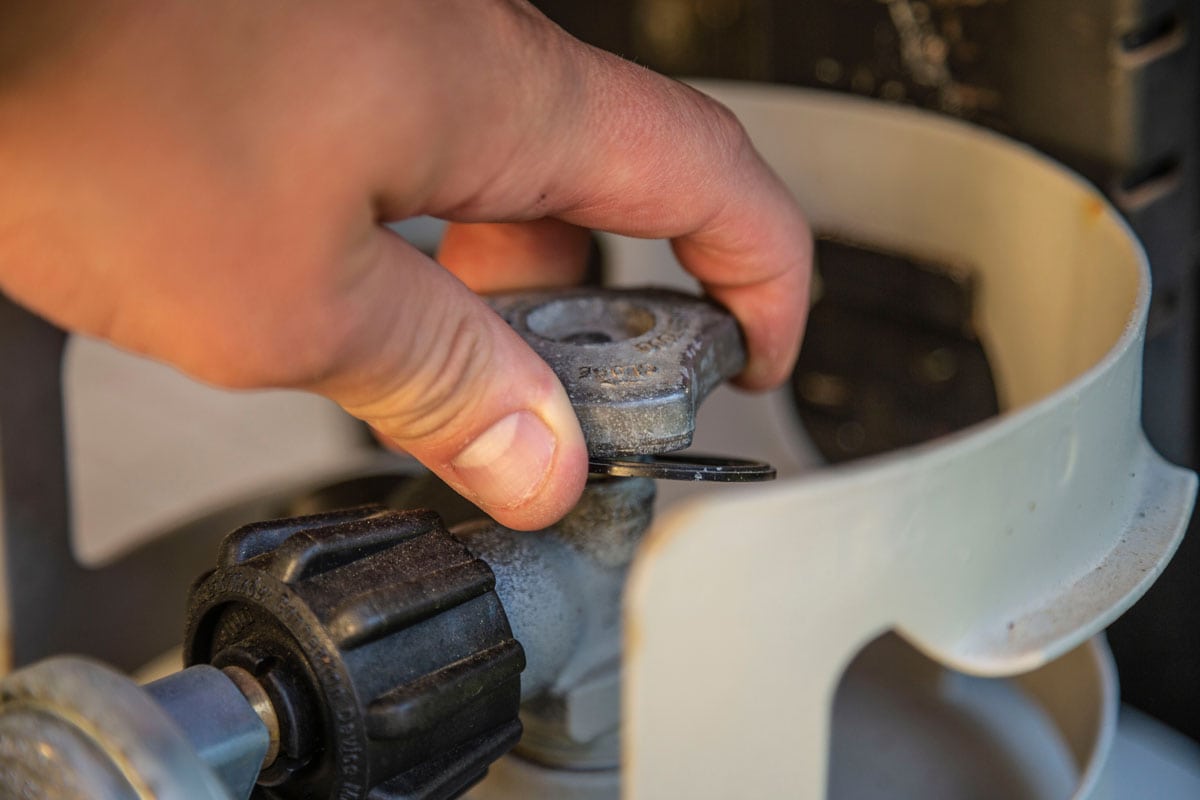
Although it is in liquid form, propane can still be dangerous. Being an asphyxiant, propane can suffocate people in extremely high doses. High exposure levels might potentially result in unconsciousness, seizure, or worst- cardiac arrest.
Frostbite can occur from prolonged skin contact. It is a gas that burns quite easily. It can blow up when heated and is kept under pressure as a gas. As it is an asphyxiant gas and collects in low-lying locations, it can be a danger in tight spaces.
Are There Disadvantages To Using Propane?
Of course! If you decide to switch to propane, you might need to replace your appliances so they are safe to use with that type of fuel. So, you also need to consider the upfront cost of switching to propane.
You must conduct research and evaluate your living environment to see whether switching to propane would result in financial savings. How much propane you use will depend on where you live, how big your house is, and how efficient your appliances are.
You'll require more frequent tank refilling if you use a lot. You will be charged for each gallon of propane when you fill your tank. The cost of propane is also influenced by a variety of market factors. Similar to natural gas costs, the cost of propane per gallon varies.
And since the propane is contained in a tank, you need to constantly check its level.
How To Properly Store Propane Tanks
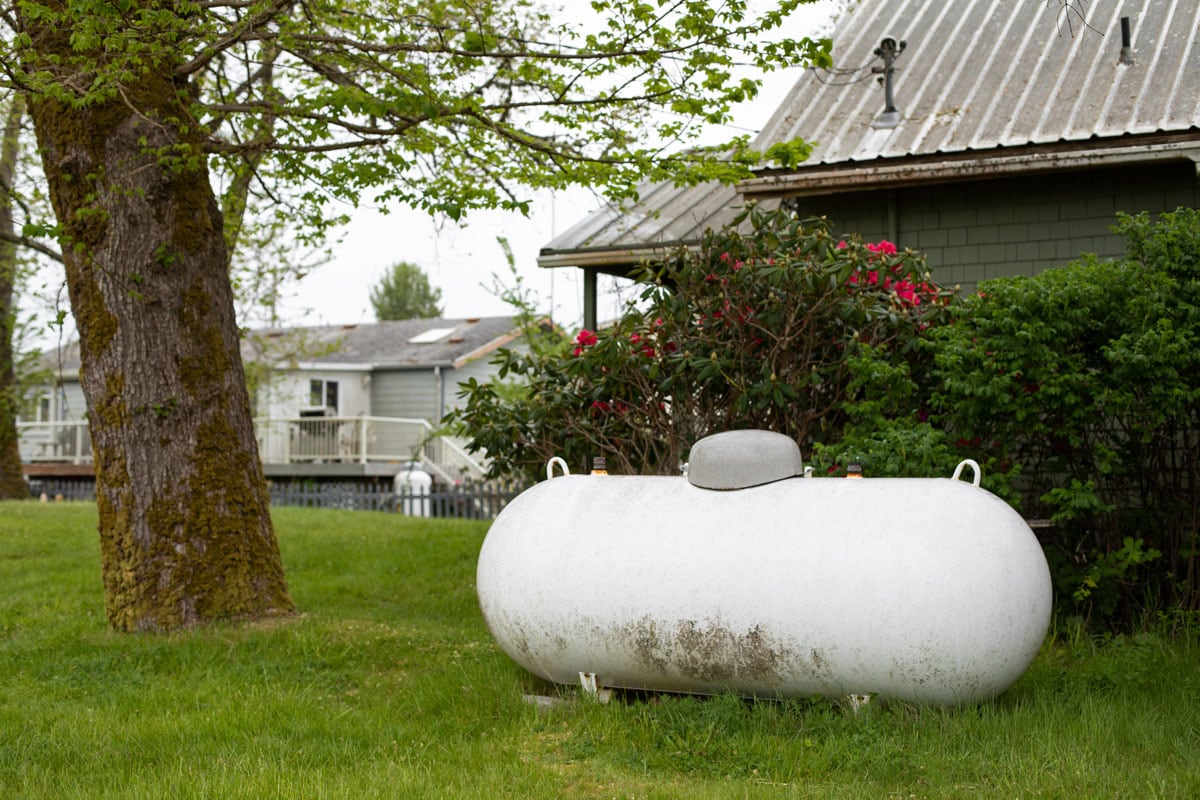
In storing propane tanks, these are the things you need to watch out for:
Location
Store your propane tanks where there is ample ventilation.
Don't risk storing it in an enclosed space, it can result in some serious damage. Keep the tank away from these places:
- garage;
- basement;
- car; and
- tent.
Additionally, you can keep your propane tanks outside throughout the winter months without risk because low and freezing temperatures are not as dangerous as high ones. But you should be mindful that rain and snow-induced dampness can lead to rusting on the tank's physical surface.
Temperature
An area with high temperatures is not a good place to store a propane tank. Due to the risk of explosion from high temperatures, it's crucial to store your propane tanks outside of your house. As the ambient temperature rises, the pressure in the tank also rises.
Make sure the temperature in the space where the propane tank is kept doesn't get above 120 degrees Fahrenheit.
Tank Cover
When you store your propane tank outside during winter, cover it with a plastic sheet. This way, you can avoid ice from forming on it and snow from covering it. This will also minimize resting and help your tank last longer.
Tank Condition
You must always check the condition of your propane tank before you store it. Check the tank itself, valves, and the connecting hose for leaks and tears.
How Do You Check For Leaks In Your Propane Tank?
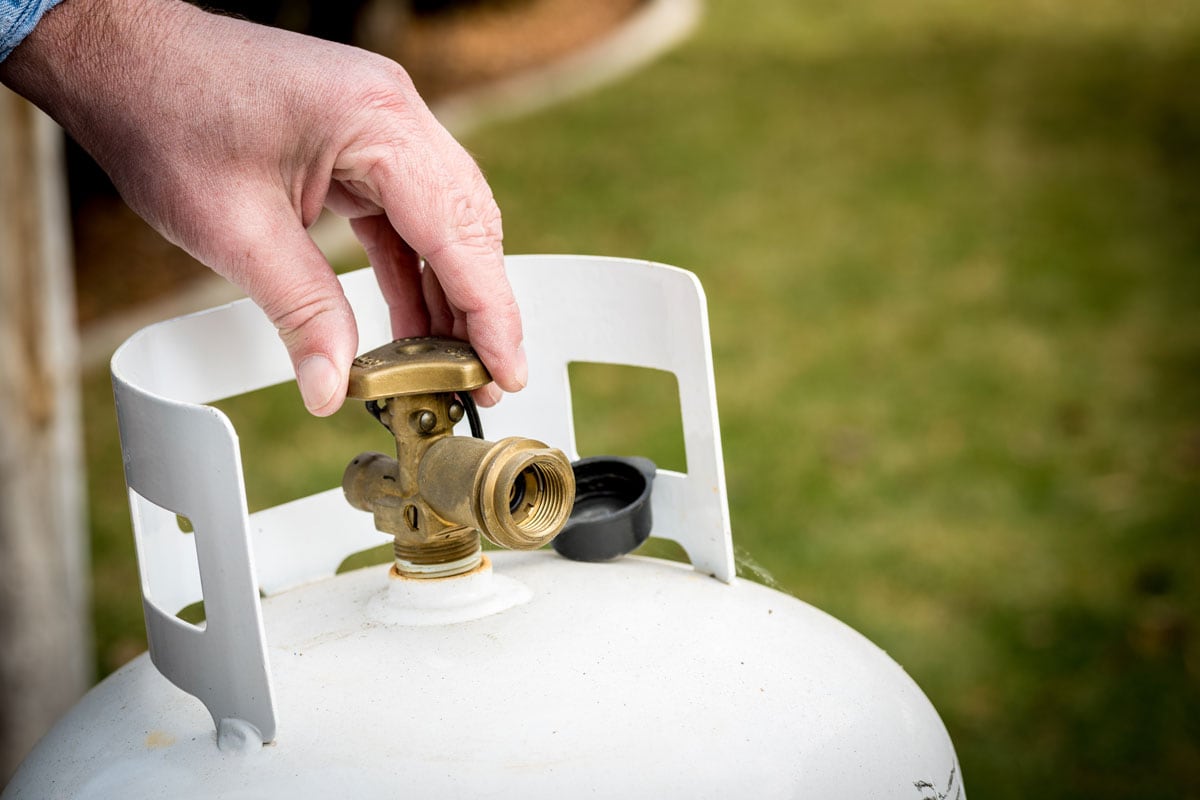
If you can smell the unpleasant odor that the manufacturer provided, that is the simplest approach to identifying propane gas leaks.
But, if you want to double-check, you can follow these two steps:
- At the junction of the regulator outlet and cylinder valve on the propane tank, spray some soapy water or a special leak-detecting solution.
Click here for this product on Amazon!
- Then, gradually open the cylinder valve. You'll know that there is leaking when bubbles appear.
What Should You Do And Not Do When There Is A Propane Leak?
Here are some tips on what and what not to do when you confirm that there is indeed propane leaking from your system:
|
Dos |
Don'ts |
|
|
Where Can You Use Propane To Fuel Appliances In Your Home?
You can use propane in almost everything in your house. Use it to keep you warm by fueling your heating system, furnaces, and water heaters. You can also use it to power up your outdoor firepit to make your stay cozy and warm.
Additionally, it can also power your stove and gas grill to help you with your cooking activities. It can also power up your washing machine to help you with your laundry.
What Are Some Strange Sound Your Propane Tank May Produce That You Need To Watch Out For?
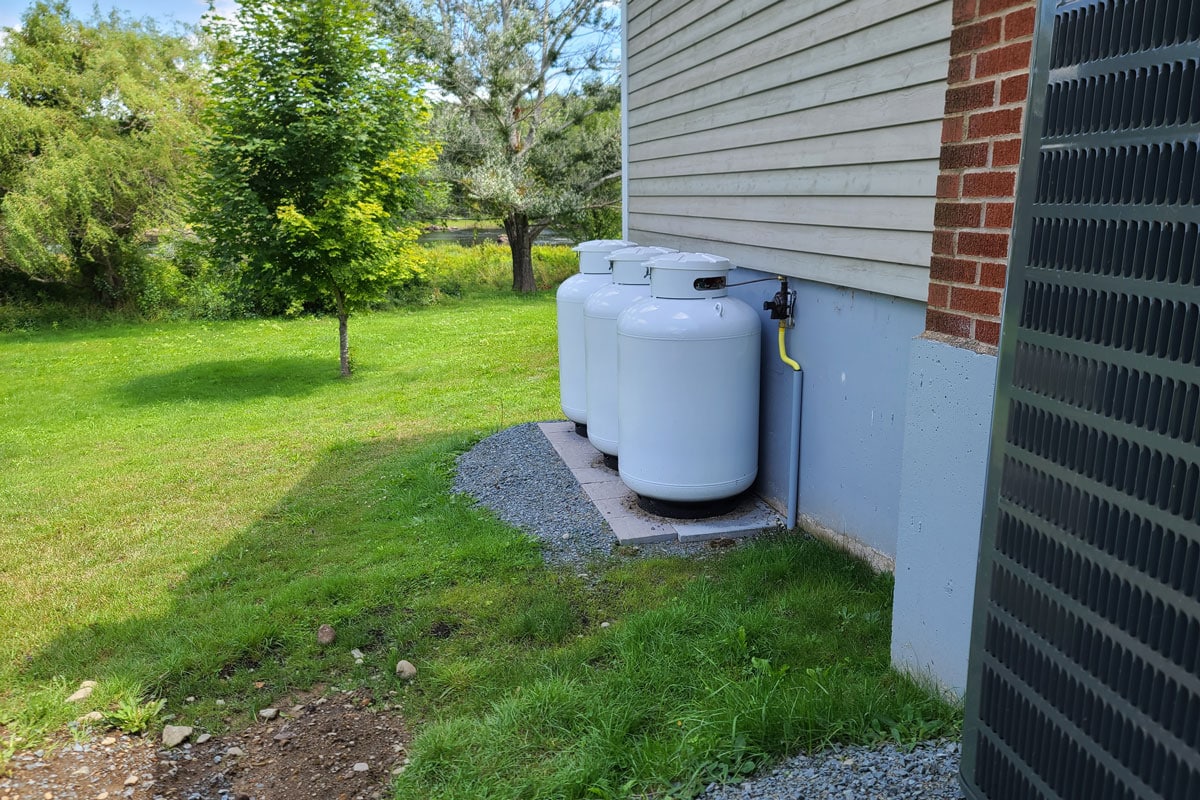
Different noises coming from your propane tank can mean varying issues. Here are some weird noises you need to watch out for:
Humming And Gurgling Noise
- When you hear this sound after you turn on the gas, it can mean that the tank is overfilled.
- A tank that is overfilled places too much pressure on the regulator, which lowers the outflow.
- Low heat, weak flames, and discolored pilot lights could result from this.
- Air that has been trapped or the regulator vibrating are other potential causes of humming. On rare occasions, the hose may develop an air pocket or the rubber diaphragm on the regulator valve may vibrate.
Knocking Noise
- When your propane gas tank begins to knock after it has been turned on, the gas and air combination is likely unequal. You can quickly determine whether this is the case or not by looking at the flames.
- Although this problem is not dangerous, ignoring strange noises runs the risk of neglecting problems that arise later.
Hissing Noise
- When you hear this noise, you should switch off your tank and call your propane supplier right away to request a specialist because this means that there is a gas leak in your system.
- The initial gas rush you hear upon turning on your propane line shouldn't be confused with any hissing sounds coming from your propane tank.
In Summary
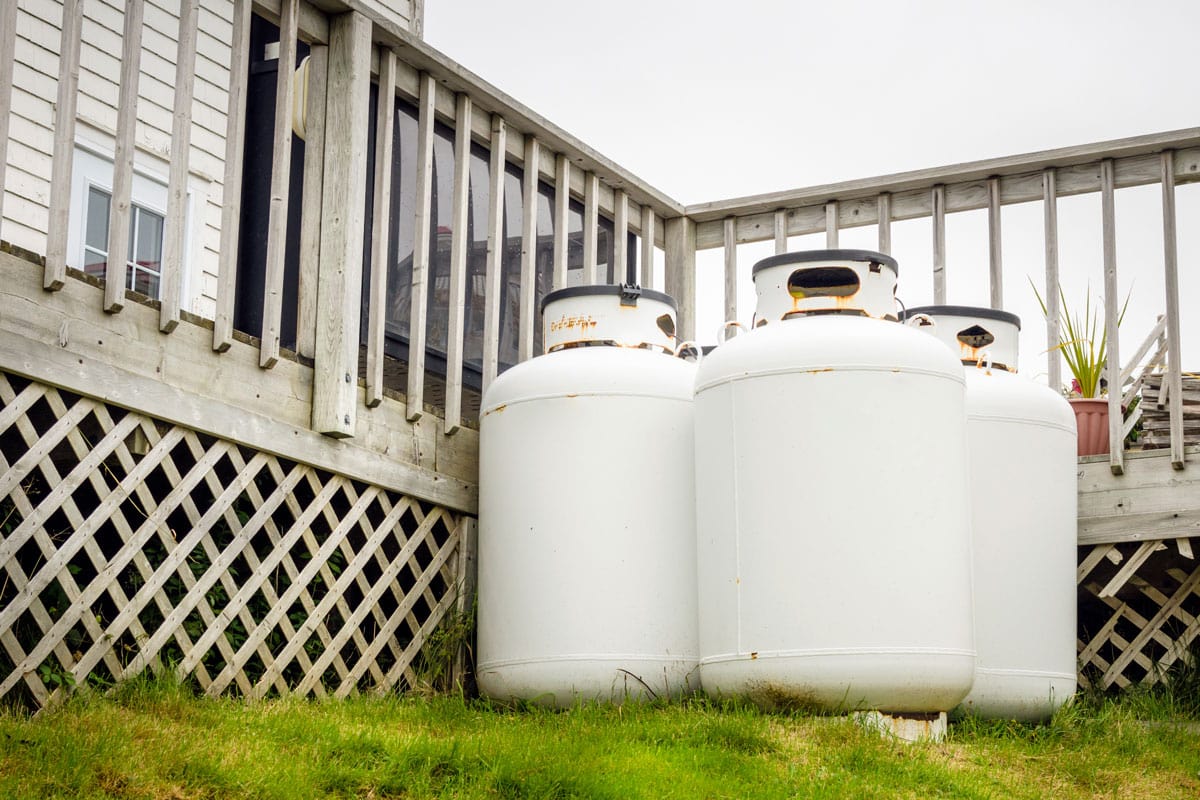
If you feel like there is liquid inside your propane tank, you don't have to worry because it's normal. Propane is usually stored as liquid so it's safe to use.
However, you still need to check if there is moisture inside your tank especially when you use it after winter.
Before leaving, you can check out these other related articles:

